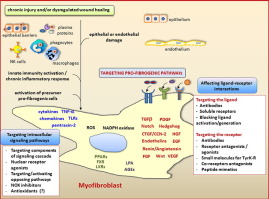Advanced Drug Delivery Reviews ( IF 16.1 ) Pub Date : 2017-06-01 , DOI: 10.1016/j.addr.2017.05.017 Stefania Cannito , Erica Novo , Maurizio Parola

|
Myofibroblasts (MFs) play a critical role in the progression of chronic inflammatory and fibroproliferative diseases in different tissues/organs, whatever the etiology. Fibrosis is preceded and sustained by persistent injury and inflammatory response in a profibrogenic scenario involving mutual interactions, operated by several mediators and pathways, of MFs and related precursor cells with innate immunity cells and virtually any cell type in a defined tissue. These interactions, mediators and related signaling pathways are critical in initiating and perpetuating the differentiation of precursor cells into MFs that in different tissues share peculiar traits and phenotypic responses, including the ability to proliferate, produce ECM components, migrate and contribute to the modulation of inflammatory response and tissue angiogenesis. Literature studies related to liver, lung and kidney fibrosis have outlined a number of MF-related core regulatory fibrogenic signaling pathways conserved across these different organs and potentially targetable in order to develop effective antifibrotic therapeutic strategies.
中文翻译:

成纤维细胞中的治疗性促纤维化信号通路
无论病因如何,成肌纤维细胞(MFs)在不同组织/器官的慢性炎性和纤维增生性疾病的进展中起关键作用。在纤维化之前,持续性损伤和炎性反应会导致纤维化,并持续持续,在纤维化过程中,MF和相关前体细胞与先天免疫细胞以及几乎任何特定类型组织中的MF和相关前体细胞之间的相互作用由多种介质和途径共同作用。这些相互作用,介体和相关的信号通路对于启动和永久分化前体细胞至在不同组织中具有独特特征和表型反应的MFs至关重要,包括增生,产生ECM成分,迁移并有助于调节炎症反应的能力。反应和组织血管生成。


























 京公网安备 11010802027423号
京公网安备 11010802027423号